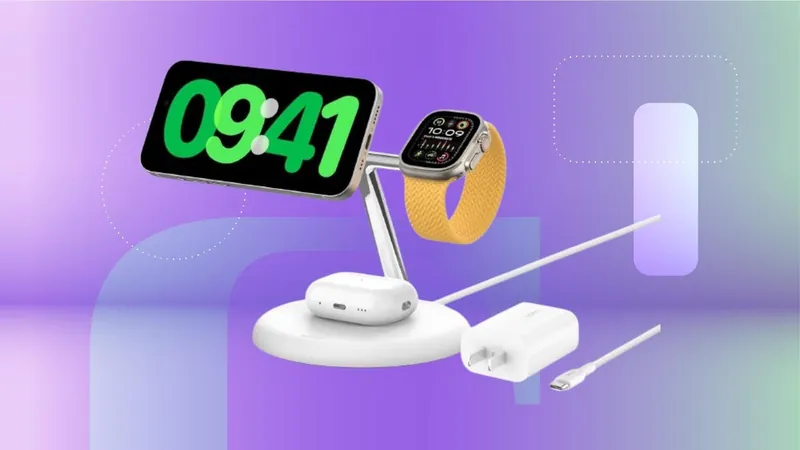
Could Unfiltered Coffee Be Your Secret Weapon Against Visceral Fat? Discover the Surprising Benefits of Cafestol!
2024-10-02
Author: Mei
What Exactly Is Cafestol?
Cafestol is a diterpene compound primarily found in coffee brewed without paper filters, such as Turkish coffee, French press, and espresso. Not only does this compound enhance coffee's flavor and aroma, but it may also contribute to health improvements. Danish researchers have recently focused on how cafestol impacts insulin sensitivity and other markers crucial for metabolic health, with initial findings hinting at its potential to ward off type 2 diabetes.
In previous laboratory studies, researchers found that cafestol can increase insulin secretion and boost glucose uptake. Animal models revealed that it improved insulin sensitivity and lowered blood sugar levels, pointing to promising implications for individuals at risk of diabetes.
Recent Findings: Promising but Inconclusive
In a recent randomized controlled trial published in the journal Nutrients, researchers examined the effects of cafestol supplementation over 12 weeks. Participants, aged 25 to 78 and at risk for type 2 diabetes (measured by waist circumference), were given 6 mg of cafestol twice daily. While the results showed that cafestol led to slight reductions in body weight and visceral fat—averaging a loss of 880 grams compared to a gain of 920 grams in the placebo group—it did not significantly improve insulin sensitivity or glucose tolerance.
Despite these findings, the study provided valuable insights, particularly regarding how cafestol influences fat metabolism, possibly suggesting an increased insulin resistance in fat tissues.
Understanding the Risks and Rewards
While the study reported no severe adverse effects, some participants experienced minor complaints such as gas, nausea, and mild headaches. Interestingly, cafestol did not significantly alter cholesterol levels or blood pressure, challenging previous thoughts on its cardiovascular risks. However, experts are wary; while weight loss and reductions in visceral fat are desirable, the increase in free fatty acids raises concerns about potential negative impacts on insulin function, which could increase diabetes risk.
Experts like Thomas M. Holland, MD, and dietitian Alyssa Simpson stress the importance of further studies. They suspect that adjusting doses or duration of cafestol intake might yield more significant benefits.
The Coffee Lovers’ Advice: Moderation is Key!
For those thinking about integrating unfiltered coffee into their daily routine for health benefits, experts recommend moderation—2 to 3 cups daily can be part of a balanced lifestyle. For maximum cafestol extraction, opt for organic, unfiltered coffee and consider grinding your own beans for freshness.
To keep your coffee habit healthy, avoid sugary or high-fat creamers that can undermine the benefits. Both Holland and Simpson suggest that natural sweeteners such as stevia or small amounts of honey are preferable when a sweeter taste is desired.
Final Thoughts: Your Daily Brew Could Be Transformative
While the potential benefits of cafestol in reducing visceral fat and aiding weight loss are intriguing, individuals should remain cautious and consult healthcare providers, especially if they have underlying health conditions like arrhythmia, as caffeine consumption could exacerbate symptoms.
So, could unfiltered coffee be a game-changer for your health? With ongoing research and a deeper understanding of cafestol's effects, this beloved beverage might just hold a key to a healthier future. Stay tuned for more updates as science continues to uncover the mysteries of your morning cup!




 Brasil (PT)
Brasil (PT)
 Canada (EN)
Canada (EN)
 Chile (ES)
Chile (ES)
 España (ES)
España (ES)
 France (FR)
France (FR)
 Hong Kong (EN)
Hong Kong (EN)
 Italia (IT)
Italia (IT)
 日本 (JA)
日本 (JA)
 Magyarország (HU)
Magyarország (HU)
 Norge (NO)
Norge (NO)
 Polska (PL)
Polska (PL)
 Schweiz (DE)
Schweiz (DE)
 Singapore (EN)
Singapore (EN)
 Sverige (SV)
Sverige (SV)
 Suomi (FI)
Suomi (FI)
 Türkiye (TR)
Türkiye (TR)